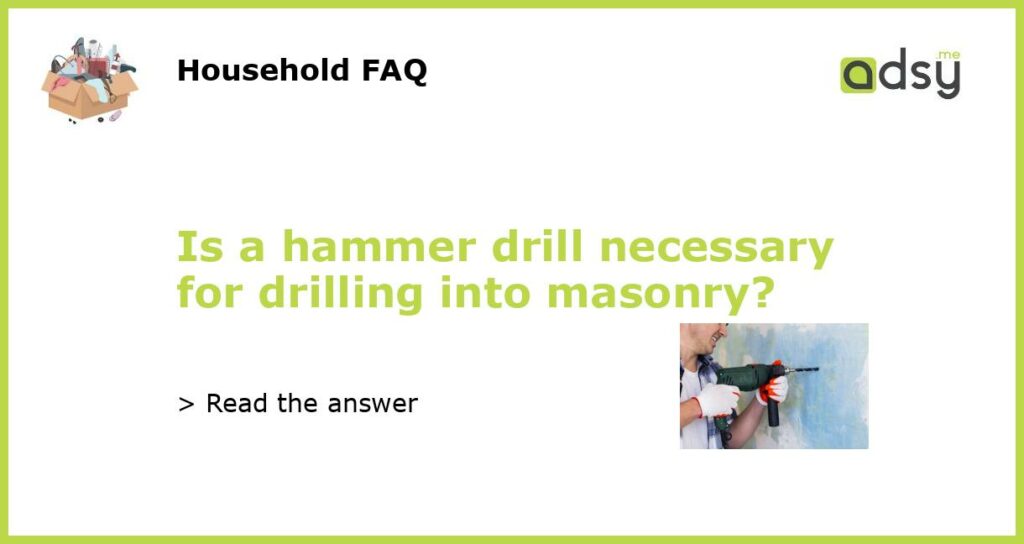Headline: Is a Hammer Drill Necessary for Drilling into Masonry?
Drilling into masonry can be a challenging task, especially for those who do not have the right tools. Many people wonder whether they really need a hammer drill to drill into masonry or if they can get by with a regular drill. In this article, we will explore whether a hammer drill is necessary for drilling into masonry and the advantages it offers for this type of job.
Headline: The Difference Between a Hammer Drill and a Regular Drill
Before we dive into whether a hammer drill is necessary for masonry drilling, let’s first understand the key differences between a hammer drill and a regular drill. Both drills share the same basic functionality of rotating a bit to create a hole, but a hammer drill has an added feature that allows it to generate a powerful hammering action.
The hammering action of a hammer drill is achieved by using a specialized mechanism that rapidly strikes the bit forward and backward while it rotates. This hammering action helps to break through tough materials like concrete and masonry more effectively compared to a regular drill.
A regular drill, on the other hand, lacks this hammering action and relies solely on the rotational force to drill through materials. While a regular drill can handle drilling into wood, plastic, and metal, it may struggle with hard materials like concrete and masonry.
Headline: Advantages of Using a Hammer Drill for Masonry Drilling
When it comes to drilling into masonry, a hammer drill offers several advantages over a regular drill:
- Increased Drilling Speed: The hammering action of a hammer drill helps to break through tough materials more easily, resulting in faster drilling speed compared to a regular drill.
- Greater Drilling Power: Masonry drilling requires a significant amount of power, and a hammer drill is specifically designed to provide the necessary force for this task. The hammering action of a hammer drill ensures that the bit can penetrate the masonry material effectively.
- Reduced Operator Fatigue: Due to the hammering action, a hammer drill does most of the work when drilling into masonry. This reduces the amount of force and effort required from the operator, resulting in less fatigue during the drilling process.
- Versatility: While a hammer drill is primarily used for drilling into masonry, many models also offer the option to switch to regular drilling mode. This versatility allows you to use the same tool for various other drilling tasks, making it a worthwhile investment.
- Minimized Risk of Bit Slippage: The hammering action of a hammer drill helps to keep the bit securely in place without slipping. This reduces the risk of accidents and ensures more precise drilling.
Headline: Alternatives to a Hammer Drill for Masonry Drilling
If you do not have access to a hammer drill and need to drill into masonry, there are a few alternatives you can consider:
- Rotary Hammer Drill: Similar to a hammer drill, a rotary hammer drill is specifically designed for drilling into hard materials like concrete and masonry. It offers a more powerful hammering action and is generally more effective than a regular hammer drill.
- Masonry Drill Bits: Using specialized masonry drill bits with a regular drill can also help improve drilling performance in masonry. These bits are designed with a carbide tip to withstand the rigors of drilling into hard materials.
- Impact Driver: While an impact driver is primarily used for driving screws and fasteners, some models offer a drilling function. While not as effective as a hammer drill or rotary hammer drill, an impact driver can still be useful for small drilling tasks in masonry.
Headline: Conclusion
While it is possible to drill into masonry using alternatives to a hammer drill, a hammer drill remains the most efficient and effective tool for this job. The hammering action of a hammer drill provides the necessary power and speed to tackle hard materials like concrete and masonry. If you frequently work with masonry or plan to undertake a significant drilling project in masonry, investing in a hammer drill is highly recommended.
If a hammer drill is not within your budget or readily available, using alternatives like a rotary hammer drill or specialized masonry drill bits with a regular drill can still yield satisfactory results. However, keep in mind that the drilling process may take longer, and the overall performance may be less efficient compared to using a hammer drill.






